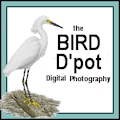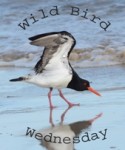Posted by: Ken @ 7:09 am
Just before departing Florida for our second home in Illinois, we managed one final walk in our local wetlands patch. Warblers were still coming through, but not in great numbers. On some days Northern Parulas were common, but we saw only a few.
They all were brightly colored males. Their foraging habits are methodical, as they usually explore one limb at a time, starting at the base of a branch and working out to the very tip. They sometimes emerge into plain view before flying to the next branch, providing photo opportunities.
Prairie Warblers are seen here all year, but their numbers are swollen during migration and winter by temporary visitors. They also tend to spend much time in a small area of a tree, but are not as predictable in their movements.
In quite the opposite fashion, the movements of American Redstarts are totally unpredictable. Many of my attempts to photograph them produce only empty branches. This sweet little female redstart paused just long enough for me to capture her beauty and energy.
This fall, Black-throated Blue Warblers have been favored subjects. The
males have strongly contrasting blue, black and white plumage. They often appeared in small same-species flocks.
I really liked the feather detail in this pose.
Warblers are attracted to fruiting shrubs, usually for the insects they attract, but both the parulas and this Black-throated Blue Warbler have a taste for privet berries.
Female Black-throated Blue Warblers do not resemble the males except for the white mark on each wing.
The face pattern of females is distinctive.
Two Yellow-throated Warblers showed up on our final walk. This was only the second time I had seen this species in our patch.
Common Yellowthroats were, well, common! Usually shy and retiring, their movements are difficult to track as they creep through the low shrubs and tall grasses. The fruiting privet (Ligustrum sp.) lured them into the open, but they seemed interested only in the associated numerous spiders and other insects.
The female yellowthroat lacks the black mask of the male.
Palm Warblers have arrived and will be here all winter. Our local visitors belong to the drab western subspecies. Interestingly, their migratory path crosses that of the more colorful eastern population, which winters in Texas and Mexico.
The Palm Warbler’s long legs are an adaptation to its habit of foraging on the ground. Early morning light enhanced the color of this one.
Another long-legged warbler, the Ovenbird, walked up almost to my feet before I saw it.
We departed Florida before seeing our first Yellow-rumped Warbler, the avian equivalent of the “fat lady” who sings at the end of the opera. Migration is not over until the “butterbuts” appear. We did catch this one the first morning after we arrived in NE Illinois, at local Nelson Lake. Sure enough, it was the only warbler we encountered there.
Of course, we saw many other interesting birds besides warblers during our final week in Florida. A Bell’s Vireo showed up once before, in October of 2009. Although it is a western species, it is a rare but fairly regular visitor to South Florida during spring and fall migrations
A pair of Common Ground-Doves posed in the early morning sun.
Blue Jays collected Live Oak acorns from the bumper crop.
Blue-gray Gnatcatchers can be a pesky distraction when we confuse them with the warblers as they they flit among the branches. However, they also seem to be “magnets” for other migrants, perhaps alerting them to food sources.
Bald Eagles regularly pass overhead just after sunrise, traveling from their nest area two miles to the north, to hunt for fish and water birds in the large lake in our subdivision. They are out earlier on clear mornings, probably because of better visibility.
The songbirds fell silent as a Cooper’s Hawk flew overhead.
A single adult Wood Stork has visited our backyard lake several times during the past month. As if to bid us adieu on the morning of our last day in Florida, a flock of six flew in while it was still dark. I had to wait to take these shots. By then only one remained on our back lawn and the others had flown to the other side of the lake.





































October 27th, 2012 at 9:08 am A wonderful collection. Your photos are stunning. The picture that impressed me the most is the closeup of the Blue Jay that shows his feathers in incredible detail.
October 27th, 2012 at 2:47 pm love those silly wood storks! but that black-throated blue warbler stole the show today! gorgeous birds!!!
October 27th, 2012 at 3:28 pm Sweet stuff Ken, truly exceptional photography, great work!
October 27th, 2012 at 5:35 pm Love the storks on the fence! Your photography is just wonderful.
October 27th, 2012 at 10:25 pm Wow, what an Amazing collection of bird shots. You captured them so close up and detailed. Their color shows so well in your shots. Absolutely amazing! Happy Sunday!
October 27th, 2012 at 11:21 pm Hi there - I never ceased to be amazed be the variety of the warblers that you get in the US - remarkable. Stewart M - Australia
October 28th, 2012 at 1:06 am Great image series showing some incredibly beautiful birds. Many of the birds you show does not live in this country - we have not so many colorful / exotic birds. Thanks for your comment on my blog - appreciate it. Wish you a good Sunday :) Hanne Bente
October 28th, 2012 at 1:50 am You take some great shots of the warblers Ken, especially considering how tiny and active they are. Guess it helps enormously that you have clearly studied their feeding habits and habitat preferences. Wish more birders would do that.
October 28th, 2012 at 1:45 pm Beautiful series!! Boom & Gary of the Vermilon River, Canada.
October 28th, 2012 at 1:46 pm Great series!! Boom & Gary of the Vermilon River, Canada.
October 28th, 2012 at 8:29 pm Great photos and text, Ken. I appreciate the details.
October 30th, 2012 at 2:35 am Love all the warbler shots, wonderful collection of birds. Great post, ken!
October 30th, 2012 at 8:46 am Exquisite photographs of lovely birds! I’m in awe of all your fabulous warbler images, each shot so beautifully captured. Fantastic detail and color. How fortunate you are to see such stunning birds at your local wetlands patch. Glorious!
October 30th, 2012 at 9:31 am Great series!!! Good post!
October 30th, 2012 at 9:35 am You got some fantastic warbler shots! I’m lucky to see any, much less photograph them. The eagle and hawk flight photos are outstanding! Love those!
October 30th, 2012 at 9:47 am You sure do get great shots of warblers!
October 30th, 2012 at 12:39 pm All very beautiful birds.
October 30th, 2012 at 2:24 pm A truly amazing set of pictures. The Black-throated Blue Warbler is my favourite though.
October 30th, 2012 at 3:42 pm Great post so many beautiful birds.
October 30th, 2012 at 5:33 pm Wonderful birds…we don’t see a lot of perching birds when we’re in Florida…. Aren’t you going the wrong way this time of year? We’re just thinking about heading TO Florida for the winter.
October 31st, 2012 at 4:36 am Fantastic series! Your images are awesome!!!
October 31st, 2012 at 4:59 am These are all just wonderful, but my absolute favorites are of all of the beautiful songbirds…very sweet faces on every one captured splendidly~
October 31st, 2012 at 11:23 am Terrific images! I seemed to be late to the party everywhere I went looking for warblers this year. Everyone said, “you should have SEEN all the birds here yesterday!”. On the other hand, it’s great to be able to get outside anytime! Have a safe trip! -Wally (Tampa area)
October 31st, 2012 at 4:09 pm So much variety - I’m well jealous. Well captured throughout.
November 4th, 2012 at 2:00 pm Thank you, all, for visiting and leaving comments. I’ve visited (or in some cases unsuccessfully attempted to comment on) your web sites, and enjoyed them all.